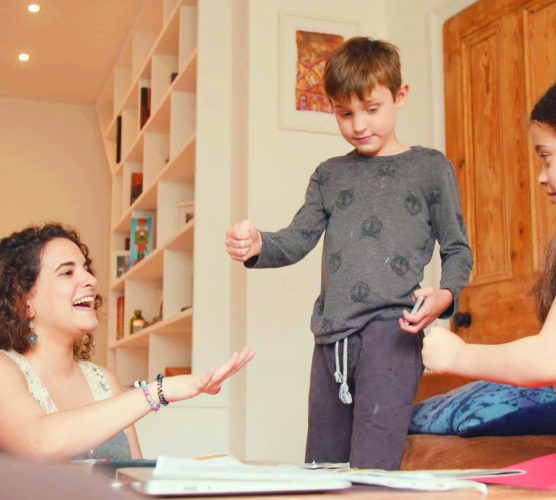Since I started working on this article, I have had friends tell me they’re frowned on because their child ‘only’ does swimming as an after school activity. Another parent talked about how she has friends doing weekly tutoring with their two-year-olds in addition to nursery. And last week when out and about, I was asked if my toddler wanted to start maths tuition (I said no).
The pressure to load up our children with extra skills and activities, especially in high-intensity, busy cities like London, is very real and starts very early. Added to that is the difficulty parents have filling the gap between the end of the school day and the end of the working day: for many, after school activities are as much a scheduling necessity as an educational benefit. In a 2018 study, Petit Filous found that despite eight in ten UK parents recognising the benefits of free play, one in five kids’ schedules are full of activities that leave little time for it. From violin to football, fencing to Japanese class, how much time is left for children to do nothing and just be? Koru Kids looks at how much after school activity is too much, the benefits of spending a little more time doing less, and how to strike a balance. What impact does taking on too many after-school activities have on children?
“Many children and teens become overwhelmed and anxious if they’re over scheduled, even if they enjoy all of the activities. We all need downtime and so do kids…some even become resentful when parents sign them up for too many extracurricular activities,” says Bonnie Compton, author of Mothering with Courage.
For teachers, there are questionable benefits to packing out children’s after school and weekend schedules. Those I spoke to described some of their very busy pupils as being less able to engage in class and other children as using their additional tuition as an excuse not to participate in their core school work. “I think one of the biggest impacts that too many after school activities has on children is that they are overtired by constantly being in an environment where they are told what to do and when,” says Heather Clarke Mackin, a lecturer in the Education Department at Queen’s College, City University of New York. The consequence of this is “limited problem solving and critical thinking opportunities for children,” she says: “it also limits their ability to develop spontaneous social interactions with their peers as they are constantly being guided by adults.”
Limiting free play time for younger children can also lead to challenges in the teenage years, says Anna, a teacher and mother of two. “Kids need to learn to entertain themselves, become resilient and also to deal with boredom. [They need to] find their own ways of making things fun and learn how to find out things for themselves. Otherwise you end up with teens who expect to be entertained at every opportunity and who expect to be spoon fed everything and have no sense of personal responsibility.”
What benefits do children draw from free play?
“Children draw immense benefits from unstructured play time. They learn creativity, problem solving, critical thinking, they build social skills and can work through their fears and stresses,” Clarke Mackin says. This is not about doing no activities outside school, but rather about leaving some time in their weeks for free play, experts agree.
Koru Kids after school nannies take care of your kids in the comfort of their own home.
Listening to your children is essential: if they don’t want to do hours of extra lessons or classes that are aimed solely at getting into the right school, question whether these sessions are really necessary, or whether the time could be better spent on child-led play, which can encourage independence and social skills. “Parents often ask me how to build their child’s confidence and self-esteem. The best way to do this is to provide opportunities for them to learn and master skills independently. Although parents’ support and encouragement is important for a child’s development, it’s also important for a parent to allow their child the opportunity for independence,” Compton says.
Teachers I spoke to agreed, and said while it’s common for children to start some after school clubs and classes because their parents have decided it’s good for school applications, more free play time could actually be better for development of crucial social and creative skills. “I had a parent apologise to me that her daughter spent lots of time playing the piano but not much practising. I told her not to apologise and said that loving playing was way more important than practising and encouraged her to bring me the pieces she was making up,” says teacher and mother Anna.
How can parents strike a balance between unstructured play time and scheduled classes?
Parents working long hours in big cities that are hothouses of school competition find this especially hard to manage. Once work is over and after school clubs are done, homework is finished and tea eaten, there is often precious little time left before bed.
"Having an after school nanny pick up kids from school and spend time with them at home can help protect their unstructured time. When we train Koru Kids nannies we give them lots of ideas for fun things to do with kids after school, but we also emphasise that they should follow the childrens’ interest. For many kids it’s a precious couple of hours when they can finally explore their own passions and ideas." Rachel Carrell, Koru Kids CEO, says.
Reluctant to add to the never ending list of parenting rules, Compton declines to suggest a set amount of time children should spend on free play, but instead recommends what she calls play breaks in their days. “Although a busy parent may feel the need to keep a tight schedule because of limited time, I advise them to make sure they allow their child unstructured play time daily. Sometimes that might only be 30 minutes, however on other less scheduled days, play time might be two-three hours or more.” Families can also slot in mini play sessions when they know there’s a very busy day coming up, Clarke Mackin says, suggesting parents are open minded in how they approach planning: “we as families can fit play time into our lives in all sorts of ways. Maybe it’s ten minutes of time while breakfast is being made in the morning, perhaps it’s playing an imagination game on the walk home from school, perhaps instead of an hour of screen time make it a half hour with a half hour of play time.”
Helen, a mother of four, says that each weekend her family spends one day or part of one day at home, where her children decide on what they do. “After homework, they can play, watch TV, play games or go in the garden and can get dressed or not. I don’t limit what they want to do even if it’s sitting in front of the telly the whole time. During the school week, they have at least an hour unless it’s a club night for them, chilling with a DVD, TV or their toys: I wouldn’t like having no time to do something for myself: kids are no different.”
Parents must also remember that they have play experts in the house: no one knows how to play better than children, and asking for their ideas on how, when and what to play is fun for all of you. “Kids can also teach their parents how to play, and it’s a great bonding experience,” Compton says: “adults don’t play nearly enough!.”
Do you have suggestions on how to balance free play time and after school clubs? Join the discussion on our Bringing Up Great Kids Facebook group.
Koru Kids after school nannies look after your kids at home.



